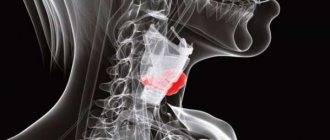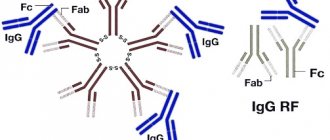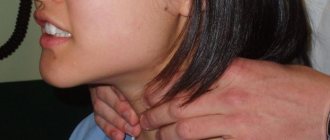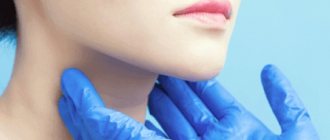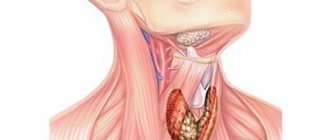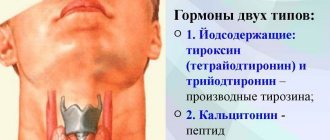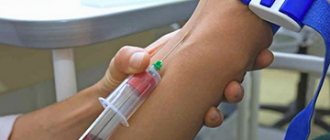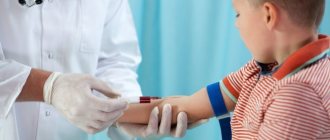- Hormones and their functions
- What hormones are determined in the analysis?
- How to prepare for a thyroid hormone test?
- Who orders the test?
- Characteristics and interpretation of indicators
The thyroid gland is an important organ of the endocrine system. It produces several hormones that are responsible for metabolism (metabolism), as well as the functional state of most organs and systems. Laboratory determination of the level of hormones produced by thyroid cells is an important diagnostic test. Based on the results of the analysis, the doctor has the opportunity to conduct a reliable diagnosis of various pathological conditions, as well as select adequate and effective treatment.
How is TSH production regulated?
The Feedback Principle in Action
The production and release of thyrotropin is carried out under the influence of thyrotropin-releasing hormone, which begins to be synthesized in the hypothalamus as soon as the level of T3 (triiodothyronine) and T4 (thyroxine), which circulate in the peripheral blood, drops. Consequently, the concentrations of TSH and thyroid hormones are inversely related.
In addition, other neuronal mechanisms influence the release of thyrotropin:
- Sleep/wake.
- Presence of nonspecific stress.
- Decrease in ambient temperature.
The rhythm of hormone production is disrupted if the subject is awake at night. During certain phases of pregnancy, TSH production drops and this is normal.
Night work disrupts the synthesis of thyroid-stimulating hormone
Factors affecting TSH concentration
The content of thyrotropin in peripheral blood is influenced by the time of day. The maximum concentration of the hormone is observed at night (200 - 400) and morning (600 - 800), and the minimum - in the evening (1700 - 1900) hours.
If a person is forced to stay awake at night, the release of TSH is disrupted. Also, low levels of hormone production are observed during pregnancy and breastfeeding, but this is the norm for such special conditions. The level of production of this biologically active substance can be influenced by a number of medications and pathologies of some organs associated with glandula thyreoidea.
In addition, heavy physical activity, severe stress, acute infectious pathologies and long-term low-calorie diets can lead to changes in thyrotropin levels.
Optimal performance
Since the hormonal background of the thyroid gland is normally based on a whole galaxy of biologically active substances and a number of auxiliary elements, the main indicators that the test can show are best demonstrated in the form of a table.
| Index | Designation | Norm |
| Thyroid-stimulating hormone | TSH | 0.47 – 4.15 mIU/l |
| Triiodothyronine total | TTZ | 1.06 - 3.01 nmol/l |
| Free triiodothyronine | FT3 | 2.62 nmol/l |
| General thyroxine | TT4 | Men – 60 nmol/l Women – 71, 22 nmol/l |
| Free thyroxine | FT4 | 9.55 – 22.4 nmol/l |
| Thyroid Hormone Uptake Test | 25 – 35% |
Antibodies to TSH
Antibodies to the thyroid hormone TSH are a certain type of immunoglobulin, the action of which is directed against the precursors of the thyroid hormone. They are considered specific markers of autoimmune thyroid pathologies.
If there is any malfunction in the functioning of the immune system, antibodies to TSH, or more precisely to its receptors, are formed in the blood serum, which cause their death, due to which the synthesis of thyroid hormones becomes impossible, or, on the contrary, is carried out in excess quantities.
There are several types of antibodies:
- increasing the synthesis of T3 and T4;
- blocking the connection of TSH with gland receptors.
An increase in antibodies to TSH is observed in diffuse toxic goiter, autoimmune thyroiditis, idiopathic myxedema, subacute thyroiditis, thyroid cancer, and other autoimmune pathologies. In addition, these antibodies stimulate the production of hormones.
If an increase in antibodies to TSH is accompanied by an increase in the level of thyroid hormones, the following symptoms occur:
- an increase in the size of the thyroid gland;
- increased production of thyroid hormones;
- exophthalmos;
- tachycardia;
- heart rhythm disturbance;
- convulsions;
- weight loss;
- muscle weakness;
- temperature increase;
- bone pain;
- hair loss;
- menstrual dysfunction in women;
- erectile dysfunction in men.
In addition, with diffuse toxic goiter, a life-threatening complication may occur - thyrotoxic crisis.
What does reduced hormone production lead to?
A reduced amount of thyrotrope hormone occurs:
- if thyroid hormones are higher than normal, in case of tumor diseases;
- with damage to the pituitary gland or hypothalamus, injuries to the head and skull, with local therapy methods aimed at damaging tumor cells (irradiation);
- in case of severe illnesses not related to the thyroid gland - euthyroid pathology.
In each case, whether the thyroid hormone is above the borderline norm, or a decrease, an individual attitude and comparison of laboratory tests, the behavior of the patient and the general characteristics of the patient are required. How to take a blood test for thyroid hormones?
Failures in the production of thyroid-stimulating hormone
The TSH concentration may change either upward or downward. These fluctuations can be caused by the condition of the pituitary gland, hypothalamus and/or thyroid gland.
Some combinations of diseases with levels of T3, T4 and TSH are shown in the table below:
| Disease | Contents of T3 and T4 | TSH content |
| Primary hypothyroidism with pronounced clinical manifestations | Low | High |
| Primary hyperthyroidism | High | Low or undetectable |
| L-thyroxine replacement therapy | High | High |
| Secondary and tertiary hypothyroidism | Very low | Normal or slightly increased |
By analyzing the TSH hormone, it is possible to identify even subclinical stages of development of glandula thyreoidea pathologies, in which regulatory mechanisms still cope with maintaining reference levels of T3 and T4 concentrations. As a rule, when conducting a screening examination of the thyroid gland, the doctor may prescribe only one test for thyrotropin, or may add to it a test for free thyroxine.
Very rarely, secondary hyperthyroidism can be caused by TSH-secreting neoplasms.
Diseases that do not directly affect the organs responsible for the rate of TSH synthesis
Diseases unrelated to glandula thyreoidea, as well as medications used to treat them, can temporarily change the level of TSH in peripheral blood. As a rule, its level falls in the acute period and rises slightly during recovery.
In such conditions, doctors use an extended reference range (0.02 - 10.00 mU/l) for TSH tests, and also determine the content of free thyroxine.
Replacement therapy
If the subject takes artificial substitutes for thyroid hormones, for example, L-thyroxine, immediately before collecting biological material for analysis, the TSH level will not change, since the normalization of thyrotropin levels occurs very slowly (it may take several weeks or even months of continuous use of medications ). The reason for this is hyperplasia of thyrotrophs, which develops against the background of chronic severe hypothyroidism.
Replacement therapy has an effect on TSH levels only after months of treatment
Therefore, it makes sense to monitor replacement therapy, using a thyroid-stimulating hormone test as a guide, no less than one and a half months after the start of treatment, drug change or dosage change.
Pregnancy
During the period when a woman is preparing to become a mother, the content of thyroid-stimulating hormone in the peripheral blood may undergo physiological changes (read more here). Since human chorionic gonadotropin, released during pregnancy, is structurally similar to TSH, it is quite capable of stimulating the production of thyroid hormones.
For this reason, the first trimester is characterized by a temporary increase in the concentration of thyroxine, which causes a drop in the content of thyrotropin. In the second and third trimesters, TSH returns to normal.
Important! An increase in the concentration of thyroid-stimulating hormone in the early stages indicates possible latent hypothyroidism, which can cause harm to the fetus.
Thyroid hormone levels
Normal concentrations of thyroid hormones ensure good health and proper metabolic processes in the body. These biologically active substances are synthesized in the body of the gland and are called thyroid. Their content in the blood is strictly regulated and controlled using laboratory tests of serum.
Thyroid hormones TSH, normal
During a visit to an endocrinologist, patients are often prescribed tests for thyroid hormones, the norm of which allows the doctor to make the correct diagnosis.
Blood is donated on an empty stomach, in the morning. The day before the test, it is recommended to avoid stress. Basic tests for thyroid hormones:
- Determination of TSH. This is a thyroid-stimulating hormone that is synthesized in the pituitary gland and regulates the functioning of the thyroid gland. The norm is no more than 4.0 µIU/ml and no less than 0.4 µIU/ml. TSH is elevated when thyroid hormone production decreases. Conversely, TSH is lowered if hyperthyroidism is observed. The range of acceptable values is quite large, since normal values vary under different circumstances.
- Free T3 and T4. Moreover, T4 (thyroxine) is converted into T3 (triiodothyronine) as needed in the body, so their content in the blood changes over the course of the day. T3 is especially susceptible to fluctuations, its concentration changes depending on age, the presence of concomitant diseases, etc. It is generally accepted that this level of thyroid hormones in a free state is acceptable: T3 - minimum 2.3, maximum 6.3 pmol/l, for T4 indicator – minimum 10.3, maximum 24.5 pmol/l.
- Bound T3 and T4. This test is not often prescribed. In a protein-bound state, the hormone is not active and does not exert its biological effect. The value of this indicator is influenced by many factors not related to the thyroid gland. For example, kidney disease and taking certain medications can reduce the amount of bound hormone, while viral diseases and pregnancy, on the contrary, increase binding.
- Antibodies to thyroglobulin (TG). Thyroglobulin is a specific protein produced by the thyroid gland. Antibodies to it are present in small quantities in the blood of a healthy person. The norm is 40 IU/ml. An excess is observed with neoplasms in the gland, autoimmune thyroiditis and some other diseases. This test is prescribed after surgical treatment of papillary thyroid cancer or its complete removal has been performed.
- Antibodies to TPO, thyroid peroxidase. The medical table shows that normally this figure does not exceed 35 IU/ml. An increased content of TPO antibodies prevents the enzyme from functioning normally and provokes disturbances in the body. The analysis helps diagnose autoimmune thyroid pathologies.
- Antibodies to TSH are special receptor proteins that compete with the pituitary hormone and block its action. This is an indicative analysis for the diagnosis of toxic goiter. To say what level of antibodies will be considered acceptable in a particular case, the doctor must evaluate a combination of several factors. On average, values below 1.5 IU/L are considered to be a negative response, values between 1.5 and 1.75 IU/L are considered intermediate, and values greater than 1.75 IU/L are considered a positive response.
Usually, an analysis is prescribed for all indicators of thyroid hormones, the norm or deviations from the norm allow a more accurate diagnosis.
Why hormone levels may deviate from normal
Your doctor may prescribe a test for thyroid hormones if you have different symptoms. Clinical manifestations of endocrine disorders are not specific and require differential diagnosis. Only an endocrinologist who takes into account all factors of the patient’s health can correctly interpret the results of blood serum studies. Sometimes, to obtain more complete information, it is additionally recommended to perform a puncture of the thyroid gland.
Hormonal levels may increase during pregnancy. This is normal and important for fetal development. The breakdown period of hormones should also be taken into account. Some appear earlier, while others appear after a certain time after gland dysfunction.
The concentration of hormones varies greatly under the influence of drugs. Thus, the concentration of T3 and T4 increases while taking heparin, aspirin and other antiplatelet agents. A decrease in content can occur as a result of taking lithium drugs, and this will not be evidence of thyroid pathology.
You should not compare your performance with the specified norm. An endocrinologist will help to adequately assess your health status and identify dysfunction of the gland.
Indications for TSH analysis
This study is prescribed for:
- alopecia;
- myopathies;
- amenorrhea;
- depression;
- infertility;
- hypothermia;
- impotence;
- decreased libido;
- cardiac arrhythmias;
- hyperprolactinemia;
- diseases of glandula thyreoidea;
- screening for congenital hypothyroidism;
- delayed development of the child’s intellectual and sexual spheres;
- monitoring the patient’s condition after treatment with hormone substitutes;
- carrying out control tests, identified diffuse toxic goiter (frequency from one to three times per one and a half to two years), as well as identified hypothyroidism (frequency one to two times per year).
Decreased libido is an indication for monitoring thyrotropin levels
The referral is written by an endocrinologist, who, in most cases, evaluates the result.
Preparing for the study
To achieve maximum results from the analysis, it is important to prepare for it correctly.
Recommendations for patients include:
- Refusal to take hormonal medications or multivitamin complexes containing iodine (only after permission from the endocrinologist). If it is undesirable to interrupt the course of therapy, warn the laboratory technician that you are taking any medication constantly.
- Avoid drinking alcohol 2-3 days before the planned examination.
- A light dietary dinner the day before the blood draw, which should be no later than 19.00.
- Testing on an empty stomach (you are only allowed to drink a little still water if you are thirsty) in the morning.
- Avoid intense physical activity and stress immediately before going to the laboratory.
You cannot have breakfast before going to the laboratory.
In addition, you will find answers to questions that interest many patients in the table below.
Note! The results of the examination may be negatively affected by previous surgical interventions and x-ray exposure. After these procedures, it is advisable to postpone the analysis of thyroid hormones for 2-3 months.
Table 1: Description of the TSH test:
| Question | Answer |
| How is a TSH test taken? | The material for the study is blood serum. Therefore, during the analysis, the laboratory assistant will have to take 5-10 ml of blood from your cubital vein. The procedure takes a few seconds and is virtually painless. |
| What is the name of the research methodology? | Immunochemiluminescent method |
| How long does it take to perform a TSH test? | Usually the finished result can be collected after 1-2 days |
| What are the units of analysis? | honey/l=μU/ml |
Hormone tests: how to prepare and what do they mean?
Conducting an analysis for biologically active substances of organic nature (hormones) - studies carried out in laboratory conditions that will help in the future about the normal functioning of the thyroid gland.
Preparations for blood tests for thyroid hormones:
- Hand over in the morning from 8.00 to 10.00.
- Refuse to eat 10-12 hours before the tests, as the content may be higher than usual.
- Create peace of mind for yourself, a psychological mood, no need to worry.
- 3-4 days before the tests, avoid alcohol-containing drinks, do not engage in physical activity, avoid smoking, and do not visit smoky areas.
- During the first test of thyrotrope hormones in the blood, it is necessary to remove medications that affect the thyroid gland within a month.
- When taking control tests, be sure to inform about the medications used.
Research technology
For the study, venous blood with a volume of 5 to 10 ml is used. In the case of monitoring the dynamics of changes in TSH concentration, the collection of biological material should be carried out at the same time of day, since the content of the hormone in the peripheral blood is subject to daily fluctuations.
Technique for collecting venous blood for TSH testing
Over the entire history of analysis, 3 generations of analyzers have been developed to determine the concentration of thyrotropin. The 1st generation is almost out of use these days, while the 2nd and 3rd generation are actively used by modern laboratories.
II generation of analyzers
It is based on ELISA (enzyme-linked immunosorbent assay) technology. The analyzers used in this case have a number of advantages:
- Low price.
- Small sizes.
- Available domestic reagents.
- Possibility of use without complex automated laboratory equipment.
But the second generation also has a negative side - the low accuracy of the results obtained (the error reaches 0.5 µIU/ml). At the same time, laboratory owners set the price for such analysis only slightly lower than when using next-generation analyzers.
III generation of analyzers
Here, another technology was taken as a basis - the immunochemiluminescent method. The TSH analysis carried out with its help has an error 500(!) times smaller than that of the 2nd generation - 0.01 µIU/ml. Therefore, it makes sense to apply for thyrotropin testing to laboratories that use third-generation analyzers.
Analysis transcript
The study result is read by an endocrinologist.
Reference values for TSH concentrations are shown in the table below:
| Age | TSH concentration (mU/l) |
| Newborns | 0.70 – 11.00 |
| 10 weeks or more | 0.60 – 10.00 |
| Up to 2 years | 0.50 – 7.00 |
| 25 years | 0.40 – 6.00 |
| 5 – 14 years | 0.40 – 5.00 |
| Adult men | 0.40 – 4.00 |
| Adult women | 0.40 – 4.00 |
| Pregnant women | 0.20 – 3.50 |
More often, a blood test for TSH hormones is required for people undergoing hormonal changes in the body - who have reached the age of forty - the period preceding menopause. But for those sixty years old and older, such control should be carried out constantly.
After 60 years of age, thyrotropin levels should be monitored regularly.
The phase of the menstrual cycle does not affect the concentration of thyroid-stimulating hormone in the peripheral blood, so it can be done on any day. Analyzes should be repeated in the same laboratory complex, since reagents, equipment and technologies in different institutions may differ, both in reference values and units of measurement, which can cause confusion in reading the results.
Elevated TSH
In rare cases, an increase or decrease in TSH value may be due to pituitary dysfunction.
Elevated levels of thyroid-stimulating hormone are observed with:
- Hypofunction of the thyroid gland - autoimmune thyroiditis or Hashimoto's thyroiditis. It is the most common cause of primary hypothyroidism.
- Tumors of the pituitary gland, which stimulates the formation of TSH. This condition is rarely diagnosed.
- Insufficient intake of thyroid hormones during treatment of hypothyroidism and in patients with a removed thyroid gland.
- Overdose of antithyroid drugs (thyreostatic) in patients with hyperthyroidism.
An increase in the level of thyroid-stimulating hormone relative to the norm in patients suffering from hypothyroidism and taking replacement therapy indicates an insufficient effect of therapy or violations that it allows. When a TSH test is received, what should be done, if its level is elevated - treatment, otherwise the risk of hypothyroidism is high.
Low TSH
Low TSH values can result from:
- hyperfunction of the thyroid gland;
- damage to the pituitary gland that prevents the production of TSH;
- taking antithyroid drugs in insufficient dosage;
- overdose of drugs in the treatment of hypothyroidism;
- third trimester of pregnancy.
If tests show low or high TSH, this indicates a problem with the functioning of the thyroid gland, but does not clarify the cause of this condition.
The table summarizes the data obtained from the research results and their potential significance:
| TSH | Free T4 | Free or common T3 | Probable Cause |
| high | normal | normal | Subclinical (hidden) hypothyroidism |
| high | short | low or normal | Hypothyroidism |
| short | normal | normal | Subclinical (latent) hyperthyroidism |
| short | high or normal | high or normal | Hyperthyroidism |
| short | low or normal | low or normal | Secondary (pituitary) hypothyroidism |
| normal | high | high | Thyroid hormone resistance syndrome |
In the thyroid gland, diseases often develop due to the formation of nodules in the tissues. It is possible to identify them at an early stage through a “happy” accident. It is unlikely that you will be able to feel a nodule (seal) slightly smaller than 1 cm in the thyroid gland with your own hands. There is no treatment as such, but regular examination by an endocrinologist is necessary.
The thyroid node is clearly visible using special equipment. If there is a rapid increase in neck volume, this may indicate a more serious or malignant disease.
Goiter.
A very large goiter can compress the pharynx and esophagus, causing difficulty breathing and dysphagia (difficulty swallowing food). In addition, the recurrent laryngeal nerve is affected, resulting in hoarseness.
Thyroid hormone TSH: general characteristics of values
If the amount of thyroid-stimulating hormones (TSH) in the body is higher or lower than normal, identified through laboratory tests, there are clear indicators of significant complications in the activity between the pituitary gland and the endocrine gland.
The performance of the thyroid gland has a very large influence on a woman’s body.
The primary type of disease is disorder and pain in the thyroid gland itself. And along with complications of the endocrine gland, located at the base of the human brain, this is secondary. To make an affirmative conclusion, one TSH analysis is not sufficient. The validity of research methods may be misrepresented for other reasons. A secondary analysis of the study of TSH levels is required, along with studies of T4 and T3.
The root causes of TSH being higher than normal, which are associated with a disorder in the thyroid gland itself:
- postoperative hypothyroidism;
- hypothyroidism resulting from therapy with radioactive iodine or due to a hereditary form of thyroiditis;
- in the recovery period of subacute thyroiditis;
- use of certain medications;
Elena Malysheva live. “My dears, do not remove the thyroid gland! Better..." Read more »
Is your thyroid gland not working properly? To help her, brew 1 spoon of dry... Read more »
An enlarged thyroid gland will return to normal in a week! The chief endocrinologist told us what needs to be done! Read more "
“Goiter” and thyroid nodules will disappear if you brew and drink every day... Read more »
All this affects the low performance of the largest human gland and can make the hormone level higher than the maximum norm. The root causes of an increase in TSH in the blood associated with disruption of the pituitary gland and hypothalamus:
- Tumors of the glandular tissue of the pituitary gland.
- Selective resistance of the pituitary gland to thyrotropic hormones.
- Lack of sensitivity of all body tissues to TSH hormones.
A reduced amount of thyrotrope hormones is observed much more often than an increased amount. During special situations (during pregnancy), a woman has a low level of thyrotrope hormones - this is a completely normal indicator.
Price of the procedure
Tests for thyrotropin levels are not carried out in all clinics, since the reagents are quite expensive, such tests are not carried out very often, so many municipal clinics prefer not to spend money on them. But in almost all cities of the country you can find at least one laboratory that still determines the concentration of TSH.
The price of the analysis depends on several inputs:
- generations of analyzers used by a particular laboratory;
- the size and status of the locality where the establishment is located;
- qualifications of laboratory complex maintenance personnel.
The cost of analysis for thyrotropin in Moscow can be several times higher than that in the periphery
For example, for residents of Naberezhnye Chelny such a study will cost 200.00 rubles, Kazan - 250.00, St. Petersburg - 450.00, and Moscow - 500.00 - 2,000.00 rubles. Within one city, a test for TSH hormones can also cost different amounts - in residential areas it is cheaper, but in the center it is much more expensive.
How to prepare for testing
Arterial blood is used to determine the amount of thyroid hormones. It is she who will provide accurate data on their excess or, conversely, insufficient quantity.
Everyone knows very well that before donating blood, you need to prepare in advance: do not eat or drink in the morning, and exclude certain foods from your diet a few days before the test. But all this applies only to those substances whose concentration varies greatly throughout the day.
Among all the thyroid hormones, the concentration of only one changes, thyroid-stimulating, but so insignificantly that it is not taken into account at all.
We list certain rules for taking tests for thyroid hormones:
- The levels of all thyroid hormones are constant over a certain amount of time and are not affected by food, fluids, or medications (exceptions are listed below).
- Tests can be taken at any time of the day; the concentration of only thyroid-stimulating hormone fluctuates slightly, but this is not a limitation for taking it at a certain time of the day.
- The only drug that can affect the amount of hormones in the blood is thyroxine. The last appointment should be in the evening, and the next day after the tests, the appointment can be continued.
- Preparations and products containing iodine do not in any way affect the concentration of thyroid hormones in the blood.
- Menstruation does not affect the level of hubbub. Men and women can get tested at any time in their lives. An exception is pregnancy, but only due to the presence of its own characteristics.
- During pregnancy, due to the presence of human chorionic gonadotropin (hCG), the amount of thyroid-stimulating hormone decreases, and with it the concentration of other hormones varies. An elevated TSH level indicates insufficient production of thyroid hormones by the thyroid gland, which can negatively affect the development of the child’s brain.
Questions for the doctor
Elevated TSH in tests
Recently, in company with my mother (she has a goiter), I decided to get tested for my thyroid gland. I received the results: TSH – 8.2 mU/l, T3 and T4 are normal. What kind of analysis is TSH? What could his increase mean? Do I need to treat the thyroid gland, provided that I have no special complaints?
Hello! TSH is a pituitary hormone that can be called the main regulator of thyroid function. An increase in its concentration can have a lot of reasons, but with normal T3 and T4 levels, it most likely indicates subclinical hypothyroidism.
I advise you to additionally undergo an ultrasound of the thyroid gland and contact an endocrinologist to decide on the need for hormone replacement therapy.
Changes in thyrotropin in tests
Hello! I examined my thyroid gland for the first time after a miscarriage at 10 weeks. Then they diagnosed “autoimmune thyroiditis” (there were signs of inflammation on ultrasound + TSH – 9 mU/l) and prescribed Eutirox 50 mcg. Recently I was examined - TSH - 0.024. The doctor said that this was not enough and immediately stopped the hormones. I repeat the examination after 2 months, TSH is even lower – 0.009. What could this be connected with, since I don’t take hormones?
Hello! To answer this question, you need to undergo additional examination (ultrasound, AT to rTSH and AT and TPO, St. T4). It is imperative to find out the cause of the developed thyrotoxicosis and, if necessary, begin treatment with thyreostatics.
Laboratory diagnosis of hypothyroidism
Valentina, 46 years old: Hello! I recently took hormone tests, TSH was 18.2 µIU/ml, T4 7.3 pmol/l. A doctor I know said that the first one is just off the charts. What are the normal TSH levels in my case? So what should I do next?
Hello! The reference values of thyrotropin for your age are 0.3-4.0 µIU/ml, T4 st. – 10-22 pmol/l. Indeed, the level of thyrotropin is significantly higher than normal: such a laboratory picture indicates insufficient functional activity of the thyroid gland, or hypothyroidism.
First of all, you need to do an ultrasound of the thyroid gland and contact an endocrinologist who can draw up a further plan for examination and therapy.
Planning pregnancy with low TSH
Ekaterina, 33 years old: I have this situation. My husband and I are planning our first pregnancy (we are no longer young), but I have problems with the thyroid gland. TSH – 0.01. The doctor prescribed Tyrozol, but it needs to be treated for at least a year. We really want a baby, can I get pregnant without taking pills?
Hello! Pregnancy against the background of thyrotoxicosis, which, judging by your TSH level, you have, is a dangerous undertaking. Of course, conception can occur, but gross hormonal imbalances are highly likely to provoke miscarriage, premature birth and other serious consequences. Therefore, before planning a pregnancy, be sure to complete the full course of treatment and make sure that your TSH and T4 levels are normal.
TSH and pregnancy
Evgeniya, 28 years old: Hello. Two years ago I was diagnosed with hypothyroidism, I am seeing an endocrinologist, I take L-thyroxine at a dosage of 50 mcg per day. Now my husband and I are actively planning a pregnancy, I am undergoing a preventive examination. According to the results of tests for hormones, TSH is at the upper limit of normal, T3 and T4 are normal. The doctor insists on increasing the dose of hormones to 75 mg/day, linking this with the upcoming pregnancy. Is this justified?
Hello, Evgeniya! To answer your question in detail, you need to know many nuances, from the history of your disease to the dynamics of laboratory tests over the past months. But in general, I agree with your doctor: without increasing the dosage of L-thyroxine in the early stages of pregnancy, you may develop subclinical and then manifest hypothyroidism.
In this case, correction of hormone therapy is a preventive measure to preserve your health and normal gestation.

